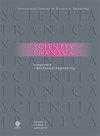Statistical Analysis Based Load Frequency Control of multi-area system with Nonlinearities using 2-DOF-PID controller with Application of Improved Sine-Cosine Algorithm optimizer
IF 1.9
4区 工程技术
Q2 ENGINEERING, MULTIDISCIPLINARY
引用次数: 0
Abstract
In this article, for load frequency control(LFC) in power system an improved sine-cosine algorithm is proposed with 2-DOF-PID controller. To facilitate the inspection, a multi-area test system(three area) has been developed. Additionally, several physical restrictions have been taken into account while investigating practical power system analysis. For every scenario considered for the experiment, the suggested approach has been employed as the optimizer of parameter of the controller of LFC. 2-DOF-PID controllers has the ability to quickly reject disturbances without noticeably increasing overshoot in set point tracking, have been utilised as the controller of LFC. The PIDF and FOPID controllers has been compare with 2-DOF-PID controller to evaluate the usefulness of it. The simulation results of SCA, SSA, ALO, and PSO are some of the algorithm with which of the proposed modified algorithm were compared, in three distinct scenarios: disturbance in three areas, disturbance in two areas, and the final scenario with physical restrictions. Wilcoxon Sign Rank Test (WSRT) has been use for the statistical analysis and 20 separate times was carried out in order to further prove the supremacy of the suggested strategy.基于统计分析的非线性多区域系统负载频率控制,使用 2-DOF-PID 控制器,并应用改进的正弦余弦算法优化器
本文针对电力系统中的负载频率控制(LFC),提出了一种改进的正余弦算法和 2-DOF-PID 控制器。为便于检查,开发了一个多区域测试系统(三个区域)。此外,在研究实际电力系统分析时,还考虑了一些物理限制。对于实验中考虑的每种情况,都采用了建议的方法作为 LFC 控制器参数的优化器。2-DOF-PID 控制器具有快速拒绝干扰的能力,不会明显增加设定点跟踪的过冲,已被用作 LFC 的控制器。PIDF 和 FOPID 控制器与 2-DOF-PID 控制器进行了比较,以评估其实用性。对 SCA、SSA、ALO 和 PSO 等算法的仿真结果进行了比较,并将所提出的改进算法与这些算法在三种不同的情况下进行了比较:三个区域的干扰、两个区域的干扰以及最终的物理限制情况。统计分析使用了 Wilcoxon Sign Rank Test (WSRT),并分别进行了 20 次,以进一步证明建议策略的优越性。
本文章由计算机程序翻译,如有差异,请以英文原文为准。
求助全文
约1分钟内获得全文
求助全文
来源期刊

Scientia Iranica
工程技术-工程:综合
CiteScore
2.90
自引率
7.10%
发文量
59
审稿时长
2 months
期刊介绍:
The objectives of Scientia Iranica are two-fold. The first is to provide a forum for the presentation of original works by scientists and engineers from around the world. The second is to open an effective channel to enhance the level of communication between scientists and engineers and the exchange of state-of-the-art research and ideas.
The scope of the journal is broad and multidisciplinary in technical sciences and engineering. It encompasses theoretical and experimental research. Specific areas include but not limited to chemistry, chemical engineering, civil engineering, control and computer engineering, electrical engineering, material, manufacturing and industrial management, mathematics, mechanical engineering, nuclear engineering, petroleum engineering, physics, nanotechnology.
 求助内容:
求助内容: 应助结果提醒方式:
应助结果提醒方式:


